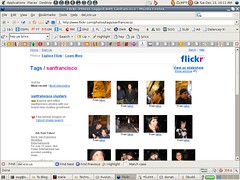Maybe it’s true that the best things in life are for free, and maybe it isn’t, but one thing is apparent to me: hardware, hosting and bandwidth, if not software, are not. Now I’m certainly no economist, but it seems a relatively simple equation to me: expenditures necessitate revenue. A couple of years ago that was less true, but it isn’t a couple of years ago. In this day and age, we may or may not be experiencing a Web 2.0 bubble, but knowing more than a few people behind next generation web applications I can tell you that business model considerations are anything but an afterthought.
But it really seems as if there’s a pervasive attitude on some corners of the web that truly believes that everything should be free. And by free, I don’t mean totally sweet, I mean no cost, and more problematic, no ads. One might think that this would leave the web application world to large institutions that can apply economies of scale towards such applications, but apparently these same folks would prefer that the apps retain their indie roots and don’t flip for one of the Google/Microsoft/Yahoo triumvirate. For evidence of what I’m talking about, just check out some of the digg comments with respect to the recent del.icio.us/Yahoo deal.
So I’m not sure what a well meaning Web 2.0 provider is ‘supposed’ to do here: they can’t charge, they can’t run ads, and god forbid they flip and recoup their investment. Well, as you might guess from what I wrote here, I’m not sympathetic to that notion. Here, in fact, is an email I sent to Josh way back in November of ’04:
just curious as to whether or not you have a paypal or some such set up
to accept donations. redmonk would like to donate something to the
cause, as del.icio.us has been huge in my research.
Josh graciously declined my offer, choosing to take outside investment to help fund his departure from a well paying job and the formation of del.icio.us. But according to the ‘wisdom’ of some of the commenters, I’m supposed to resent his efforts to defray costs? I don’t get it.
More than one of the commenters around the del.icio.us acquisition cited Flickr as an example of the negative consequences of acquisition, decrying the “ads” that Yahoo is now running on the service. Well, it took me a little while – and I had to log out of my account, but I finally tracked down a screenshot of said ads (inset). What I don’t get is why I’m supposed to be upset by some unobtrusive text ads and a link to Yahoo images running alongside the application. Seems to me that Yahoo’s doing the right thing: monetizing non-paying users with ads, while shielding paying users from the minor inconvenience. Contrast that with a property like ESPN, which despite having monetized me by putting Peter Gammons behind the paywall, still bombards me with all sorts of heavyweight, crash-your-browser type ads.
To me, the situation is not particularly complicated. Hardware costs money. Bandwidth costs money. Dev time costs money. That money has to come from somewhere; whether its ads, service costs or other sources. And let’s not forget that even with some monetization, scaling is hard for the smaller folks.
So while I can’t speak for anyone else, here’s my deal: I respect the rights of the application providers – good guys like Alex and Scott – to monetize me as they see fit, just as I retain the right to exit should I find their revenue strategy particularly onerous. And if they’re lucky enough to flip as in the case of del.icio.us, I’ll say congrats and hope the acquirer doesn’t screw it up. Because while the best things in life may be free, the best things on the web rarely are.

